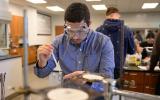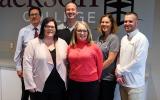Student Services

Across the nation, colleges continue to grapple with a steep rise in the number of students seeking mental health support. Mental health challenges often manifest directly in academic performance—missed classes, difficulty concentrating, or decreased engagement—making support systems essential to learning (Center for Community College Student Engagement, 2024). Many community college learners face socioeconomic barriers, including difficulty accessing affordable behavioral health services (Lipson et al., 2021). These same challenges often intensify their mental health needs while...
Tags:

In February 2023, Monroe Community College (MCC) was invited to join a cohort of nine other two-year institutions to participate in the Aspen Institute’s Unlocking Opportunity: The Post-Graduation Success and Equity Network.[i] More than a student success initiative, Unlocking Opportunity (UO) was designed to help participating colleges usher in sweeping reforms at their respective campuses. This endeavor would subsist at the intersection of academic and student-support services and focus on boosting post-completion outcomes, making possible more streamlined transfer in higher opportunity...
Tags:

In an October 2024 issue of Member Spotlight, the author detailed how Delta College rethought transfer efforts to better impact its students through agreements with four-year partners. As the new Dean of Transfer Programs and Online Learning, he was also charged with exploring transfer pathways to improve the college’s ability to better track students along their journey. Previously, Delta entered into a number of transfer agreements without regard for their efficacy among Delta students or whether they were needed in the first place. Delta needed to be more intentional with its transfer...
Tags:

In recent years, it has become difficult to engage students outside of the classroom due to their expanding personal and professional obligations and the rise of asynchronous learning modalities in the wake of the COVID-19 pandemic. It is also often challenging to compete with technological advances, which allow students to watch movies, play games, and engage in social media from the comfort of their homes. However, according to the U.S. Office of the Surgeon General (2023), “human beings are biologically wired for social connection. Our brains have adapted to expect proximity to others” (p...
Tags:
In 2014, Dalton and Crosby noted that, “colleges and universities have long recognized that helping students to become personally connected and committed early in college is critical to their successful retention and graduation” (Abstract). However, feeling connected to an institution and its academic process can be “especially challenging for new students who must quickly master a wide range of academic, personal, and social adjustments” (Dalton & Crosby, 2014, Abstract).
In a mission to retain students and guide them toward success, Rio Salado College, an online community college based...
Tags:

In July 2022, Rogue Community College’s (RCC) new President, Dr. Randy Weber, energized the college with an initiative to stabilize enrollment. This was identified as the first of five institutional priorities. Leveraging his expertise in strategic enrollment management (SEM), Weber, in collaboration with the newly appointed Dean of Enrollment Management, spearheaded a strategic shift. This transition moved the college from a narrow focus on recruitment and new students to a more comprehensive approach, embedding American Association of Collegiate Registrars and Admissions Officers SEM...

The Seattle Promise Initiative, a pioneering program launched by the City of Seattle, aims to ensure that all public high school graduates in Seattle have access to higher education without the financial burden of tuition. An innovative component of this initiative is the Path to UW program, a collaboration between the Seattle Department of Education and Early Learning, Seattle Colleges, and University of Washington (UW). The program provides targeted support to Seattle Promise students as they transfer from community colleges to one of the most competitive universities in the nation....
Tags:

When St. Louis resident Bobbie Simmons enrolled at St. Louis Community College (STLCC) to study medical coding, it seemed like she was finally on the path to a rewarding career in a high-demand field. Then a serious health issue set her back, threatening her ability to maintain a dependable source of income for rent. “It was hard focusing on my schoolwork when I didn’t know if I’d have a roof over my head,” said Simmons. Her story is not unique; many students at STLCC face similar challenges.
Thanks to a new STLCC program, students like Simmons, who face housing insecurity, now have a...
Tags:

Incoming first-year students at Moraine Valley Community College who are interested in pursuing a degree in science, technology, engineering, and mathematics (STEM) have an opportunity to participate in the Greer Scholars Program, which seeks to diversify STEM careers by funding and supporting students who are underrepresented in these fields.
The Greer Foundation, which champions organizations committed to helping people improve their lives, chose Moraine Valley as the first Chicago-area community college grantee to support a cohort of students as Greer Scholars. The foundation has been...
Tags:

Noncredit workforce education has long been an important function of community colleges. These programs typically prepare students for industry-sponsored certifications, licensures, and/or college-bestowed certificates. They have traditionally been siloed away from credit programs, and, thus, do not have to match credit hour requirements and semester schedules. Yet, in recent years, the landscape of noncredit workforce education—in terms of funding availability, program offerings, and its stature and location within colleges—has shifted dramatically (Van Noy & Hughes, 2022).
Changes to...
Tags:

Transfer students represent approximately 35 percent of Delta College’s student population (Delta College, n.d.). According to the college’s Institutional Research department (Kevin Hobart, August 14, 2024, personal communication), from 2014 to 2019, 2,796 Delta College students completed an associate’s degree program; 1,851 of those students transferred to a four-year institution and 1,357 completed a bachelor’s degree at their transfer institution.
As part of our efforts to strengthen transfer student success and Delta’s work with postsecondary partners, one of the college’s strategic...

The Ohio Department of Mental Health and Addiction Services (OMHAS) found a 353 percent increase in demand for behavioral health treatment between 2013 and 2019 (Hernandez & Lampl, 2021). Additionally, 2.4 million Ohioans live in communities that lack adequate behavioral health professionals (Ohio Department of Mental Health and Addition Services, 2023). In response to this crisis, a collaboration was formed between OMHAS and the Ohio Departments of Higher Education and Medicaid. The mission of the resulting Ohio Wellness Workforce Great Minds Fellowship is to increase the number of...
Tags:

Student access and success are foundational to the community college mission. The learning paradigm proposed by Barr and Tagg (1995) initiated the student success movement, which paved the way for the completion agenda in the 2000s. However, only approximately 26 percent of community college students transfer to a four-year institution (Sansing-Helton et al., 2021). The situation is even bleaker when we evaluate the STEM fields. According to the Community College Research Center (2022), low-income community college students are less likely to transfer to a STEM field, and only 14 percent of...
Tags:

Jackson College has been committed to providing excellent education and support to its students for over 95 years. In today's fast-paced world, college students' requirements and needs are evolving. To address these needs, Jackson College has initiated a pilot program called Harriet's Hub, which serves as a one-stop student resource center.
The name hearkens back to the college’s heritage, remembering a former faculty member, Harriet Myer, who helped college students by establishing a student assistance fund. With two rooms of dedicated space in the college’s library, the hub provides...
Tags:

Embracing neurodiversity in educational environments entails challenging traditional perspectives on cognitive differences. The term neurodiversity acknowledges the inherent variation in neurological functioning, emphasizing that diverse cognitive profiles contribute to the richness of the human experience. It encompasses conditions such as autism spectrum disorder, attention-deficit/hyperactivity disorder (ADHD), dyslexia, dyspraxia/developmental coordination disorder, Tourette syndrome, sensory processing disorder, obsessive compulsive disorder, and social pragmatic communication disorder,...

Postsecondary institutions have long recognized the importance of student success and retention, with many colleges and universities explicitly emphasizing these goals in their strategic plans (Darabi & Garland, 2018). Throughout the United States, campus learning centers, which the National College Learning Center Association defines as “interactive academic spaces which exist to reinforce and extend student learning in physical and/or virtual environments” (as cited in Darabi & Garland, 2018, p. 4), regularly contribute to success and retention efforts. Delta College, which serves...
Tags:

In 2016, a group of students sent a letter to Seattle Central College’s administrators to name a part of their identity they felt was being overlooked as they embarked on a journey that would be pivotal in determining their futures. The students, who were previously incarcerated, had chosen education as the path to restart their lives upon leaving a Washington state prison. While community and technical colleges are open access institutions, they are still institutions with barriers that are, at times, only visible to some of the most minoritized and marginalized in our communities. In...

In January 2018, 14 local school district superintendents and Jackson College’s (JC) President and CEO, Dr. Daniel J. Phelan, initiated the launch of Jackson County Early College (JCEC), designed to offer students the opportunity to earn a high school diploma and an associate degree, certification, or up to 60 college credits. This article highlights the program’s successes since its first students walked through the doors in fall 2018.
Cost Effectiveness
Since the inception of JCEC, JC has reduced tuition and fees for early college students in a variety of ways. The college capped digital...

Calhoun Community College and Drake State Community & Technical College officials have developed a partnership that will not only address learning obstacles for adult learners, but job training needs as well. Greater Opportunities for Adult Learners (GOAL) is a free program designed specifically for individuals who do not have a high school diploma and want to become more employable. Individuals who enroll in the program have access to educational resources focused on improving their reading, math, and language skills to obtain a GED, learn English as a second language, and/or earn a...
Tags:
October
2021
College students who are parents, a.k.a., student-parents, have always been enrolled in community colleges, but only within the past few years have they been explicitly recognized as a distinct student group with a unique set of support needs. According to the Institute for Women’s Policy Research (2018), more than one in five postsecondary students in the U.S. is a student-parent. This holds true at Monroe Community College (MCC), where 21.4 percent of students enrolled in 2019-2020 had children under age 18 (DeMario, 2021).
Student-Parent Risk Factors
Figure 1 shows that MCC’s student-...
Tags:










